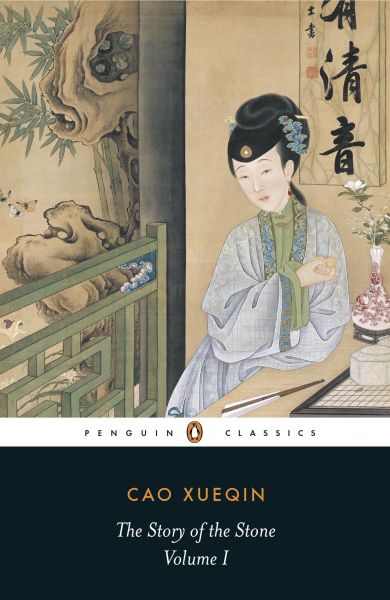Into the Fire
The Golden Days (The Story of the Stone, or The Dream of the Red Chamber, volume 1)
By Cao Xueqin (Translated by David Hawkes)

22 Jul, 2021
The Golden Days is the first volume of Cao Xueqin’s 1791(ish) The Story of the Stone, or The Dream of the Red Chamber. David Hawkes’ translation is from 1973.
Bao-yu knows that he was born to a good family, and that he was born with a piece of enchanted jade in his mouth. He doesn’t know that he’s a remnant of a construction project by the goddess Nu-wa, a remnant that wandered hither and yon and was eventually born as a human, to live and die as humans do.
Bao-yu was born into a Qing China that had enjoyed a century of peace and prosperity. His family are literati, bureaucrats, servants of the state. The family’s continued status depends on producing a sufficient number of hard-working, diligent scholars who can pass competitive exams (something that cannot be guaranteed) and never offending the imperial court by any action, lack of action, or even connection with a wild baseless rumor (lack of offense is also not guaranteed). If they can keep their status, family members can expect to lead lives of comparative ease and luxury.
Bao-yu has all the essential elements to carry on the great work of ensuring his family’s prosperity. He is charming, attractive, and highly intelligent. When he cares, his manners can be impeccable. Alas for his parents’ peace of mind and his clan’s well-being, he is also largely uninterested in scholarship or passing the exams. Bao-yu is endlessly distracted by beautiful women, with whom finds himself surrounded. Whenever he must choose between pursuing his studies or pursuing women, flirtation almost invariably wins. This does not bode well for his family.
~oOo~
Given occasional deaths by demon, and the ease with which characters wander from the mundane world to the realm of the gods, Western readers might read this as fantasy. But it wasn’t intended as fantasy; that’s consensus reality for Qing China.
Penned by a Chinese author down on his luck, the semi-autobiographical The Story of the Stone is regarded as one of the four great works of Chinese literature, along with Water Margin, Journey to the West, and Romance of the Three Kingdoms. Readers hefting the Golden Days will not be intimidated by its length … until they realize that this 540-page book is merely the first of five volumes and the story as a whole makes your average James Clavell or James Michener tome look like a novella.
Cao Xueqin makes full use of his pages, offering a cast large enough that merely naming them all would exceed my word count for these reviews. This allows him to paint a very detailed, sympathetic, (although not entirely respectful) portrait of life in Qing China immediately before the Century of Humiliation kicked off.
Translation was a monumental task. The first three volumes, translated by Hawkes, appeared in 1973, 1977, and 1980, while the last two volumes, translated by John Minford appeared in 1982, and 1986. No surprise, given that the full story is just short of a million words and that no doubt the translators expected their translation of this classic to get close scrutiny.
Bao-yu being the protagonist, one might lead one to expect focus entirely on the upper classes but this is not the case. Xueqin finds time to give at least some of the servants moments in the spotlight.
Most of the other works I’ve read set in China, or worlds inspired by China, tend to set their tales in periods that lend themselves to thrilling martial adventures, adventures enabling the protagonists to rise to the challenge of fending off (or failing to) Jurchen invasions, trying to reunify a shattered China, dealing with thinly disguised Japanese invasions, or just managing the complications inherent in being the lone survivor of the loser side of a dynastic crisis. This is a rare exception, illustrating a Qing China a generation or two before the wheels fell off.
Perhaps it’s the unrelentingly grim CanLit offered to students in the long long ago, but I expected something a bit more … morose than the work in hand. In fact, it’s often funny, although that does not prevent unfortunate supporting characters from dying in heaps from maladies and the occasional demonic attack.
While not suited to my usual approach to reviews — there is way too much going on to summarize! — the convoluted narrative serves to set the foundation for Bao-yu’s life. However, comments from the translator suggest that the novel parallels its author’s lamentable decline into genteel poverty. Therefore, no matter how promising matters may be for Bao-yu, calamity must await. Will this be due to his personal failings or events beyond his control? To borrow from the end of each cliffhanger chapter, that will have to wait for my review of volume 2.
The Golden Days is available here (Amazon US), here (Amazon Canada), here (Amazon UK), here (Barnes & Noble), here (Book Depository), and here (Chapters-Indigo).
